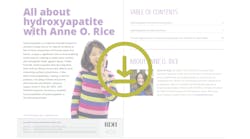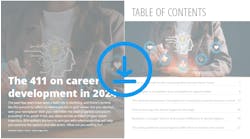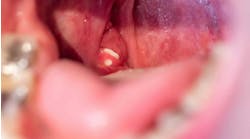The wrath of Mother Nature was in full view for U.S. residents in 2005. The news was filled with hurricanes, floods, droughts, fires, and mudslides. Amid these trying times, the question of emergency preparedness was on the minds of many. Although probably too late for many victims, television stations carried stories about the items necessary for survival in the aftermath of a natural disaster. Local health agencies held preparedness skills classes, and churches constructed “personal survival packets” for those in the affected areas.
My survival skills were recently tested on a holiday road trip. Each year on December 26, my children and I visit my parents in Idaho. Each year fewer children make the journey due to college commitments, jobs, or living location. This year, the voyage was made by four teenage sons, a seven-month-old puppy, and me. There were several things I was not prepared to deal with on the return trip to California. A drive that normally takes 14 hours took 36 hours. We listened to The Southpark Movie three times, and the puppy passed gas every time he was nervous. This was just the beginning. We endured two full days of fast food, and weather that made it impossible to open the windows. While next year’s preparations will include more appropriate movies, air freshener, and boarding for the puppy, we have opted for flying instead. Now that’s being prepared!
It is necessary to learn many of life’s lessons by experience. Preparation is something we often think about only after the need arises. During my personal reflection of preparedness after recent flooding, my thoughts turned to my career. In health care delivery, we must be prepared for the “unthinkable.” We must be prepared for possible emergencies while caring for patients. It is also imperative to be prepared for possible disasters facing our profession as a whole.
A thorough and complete patient health history is one of our most valuable tools for avoiding emergencies during dental care. This form will assist us in preparing for any possible situation that may arise. For example, if the patient is diabetic, a quick check can be made to ensure a glucose source is within easy reach. Yet, the form is only effective if it’s used.
It is never appropriate to accomplish a health history update by asking, “Are there any changes in your health or medications since your last visit?” particularly if the question is asked while putting on the patient napkin and donning your gloves. Realizing that an entire recall appointment cannot be devoted to updating history, time constraints can still be met if the patient is allowed to view the sheet and personally make changes.
There is not one perfect health history form in the dental world. It is important that you are comfortable with the information gleaned from the form used in your practice. You may verbally ask questions you feel are missing. Just remember to note the responses to these questions. Upon reviewing forms from several offices for this article, it became apparent that most practitioners know what vital information to collect. Office questionnaire details vary, however, such as how often a new form is filled out by the patient, how often it is updated by the clinician, or what language is used. For example, one form asked women if they were expecting a child, while another asked about pregnancy. As one who adopted children, I know there is a difference. A striking and somewhat scary similarity was the absence of any notation area for blood pressure and pulse. Since I am sure every office collects this vital information, why not dedicate space to record the numbers?
As health-care providers, we must be constantly alert for emergencies not related to the patient’s health. Aspiration of a restoration, whether removed intentionally or not, is always a possibility, yet a situation we never expect to confront. The use of local anesthetics and nitrous oxide can lead to other potential emergencies. Continuing education is essential for those who administer either pain control method.
The preservation and advancement of our profession also requires preparation. Plans for action need to be in place before states are presented with the reality of “scaling assistants.” I find it ironic that several states have or will soon implement expanded duties for assistants, yet many deny general supervision for dental hygienists. It should scare each and every one of us that the public recognizes the title “dental assistant,” while the dental hygienist is often called a technician and thought of as the perky, young girl who cleans teeth.
Slowing the advancement of dental assisting is not the goal. Instead, we need to implement plans and support those working for the advancement of dental hygiene as a stand-alone career. National licensure for the RDH could be a discussion topic within every dental board if we made sure it got on the agenda. Even if you are not the vocal type, you can encourage and support the courageous souls willing to voice the need for general supervision of all dental hygienists.
In California, it is now possible for third- and fourth-year dental students to practice dental hygiene. Yes, they must follow guidelines and pass tests, but essentially our careers can temporarily be placed in the hands of people with less clinical education in treating periodontal disease. I was in the dark about this very important issue because I did not belong to any state or local organization for dental hygienists, and the concept took me by surprise a few years ago when it was a bill before the legislature. Believe me, I reactivated my membership in ADHA the next day. Although I can’t always be part of the solution, I can refuse to be part of the problem. If we expect the ADHA to be as powerful as the ADA in implementing change, we must show the same commitment to membership.
Not everyone has the same vision for dental hygienists. If you are comfortable with the current scope of practice and its limitations, it is important to have your view heard. There are some in our profession who are against national licensure, and their opinions deserve a place in the discussion. Many of us would like to see the ADHA’s vision of Advanced Dental Hygiene Practitioners become a reality, and I can guarantee this group will not be silenced. Whatever your stand on important issues facing dental hygiene, it is in your best interest to find hygienists who share your view and make sure your voices are heard. The adage still holds true; there is power in numbers.
When faced with a dilemma for which you are unprepared, locate a procrastinator. These individuals appear to have the edge when dealing with unplanned situations. Even when we know an event is coming up, many of us may not prepare for the occasion until the last minute. Procrastinators are adept at dealing with last minute changes or unexpected events. A true procrastinator can fake his or her way through any situation by using skill or shrewdness. When you want a task completed with a deadline of yesterday, find a procrastinator. It may not be pretty, but the assignment will be finished - before the deadline.





